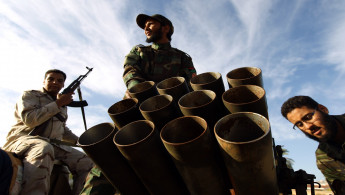Libya's rogue general denies bid to oust prime minister
A leading Libyan military commander has denied he ordered the prime minister's convoy to be blocked late last week.
General Khalifa Haftar, commander of the Libyan National Army and operating with the authority of the internationally recognised parliament in Tobruk, tweeted his denial after Prime Minister Abdullah al-Thani's visit to Benghazi.
Mohammad al-Hijazi, the spokesman for Operation Dignity, also rejected reports that Haftar was subjected to an assassination attempt on Wednesday.
The reports of an attempt on Haftar's life come at a time when his opponents are talking about divisions and disputes in the leadership of Operation Dignity, and possible attempts to overthrow the rogue general.
Ousting him from the army leadership would exclude Haftar from any government that might emerge under the UN-sponsored national dialogue talks.
| What's going on in Libya? | |
|
The General National Congress was the Islamist-led elected body ruling Libya for two years following Gaddafi's ousting and death. After its 18-month deadline to form a new constitution passed in January 2014, the body unilaterally resolved to extend its mandate. |
Reuters quoted a senior official who accompanied Thani on the visit to Benghazi.
He said the convoy was stopped by an armed group of 70 soldiers as they attempted to leave the city of al-Maraj, east Benghazi - Haftar's stronghold.
Analysts have not ruled out the possibility that Haftar's patience had run out, and that this was part of an attempt to seize complete control over the east of Libya - almost all regions of which are under his control.
Darna eludes Haftar's reach, and is held by armed Islamist groups.
Video footage has emerged and spread via social media showing a leader of the Madkhili Salafi group in Libya, Mohammed al-Awami, a Haftar supporter, threatening the Libyan House of Representatives in Tobruk with a coup if it did not hand over complete control to a new military council headed by Haftar.
The video footage sheds light on the nature of the fractious relationship between Haftar and those, including the prime minister, who endorsed Operation Dignity when it was launched on May 16, 2014.
Haftar's supporters are blaming the deteriorating humanitarian situation in Libya's east on Thani's government, absolving Haftar of responsibility.
According to analysts, after its success in cancelling the Political Isolation Law, the National Forces Alliance within the Tobruk-based parliament is planning to put forward Libya's former UN representative, Abdul Rahman Shalgam, as a candidate for the presidency of a future National Consensus government.
Haftar reportedly fears the ongoing talks will exclude him from decision-making circles.
Some analysts have said Haftar may change tack after tribal and regional divisions emerged over supporting Operation Dignity.
| Haftar reportedly fears the ongoing talks will exclude him from decision-making circles. |
He is also said to be facing opponents from within his own armed group.
Haftar's second-most important stronghold, after al-Maraj in east Libya, is al-Bayda - home to the al-Barasi tribe.
Some tribal leaders are undestood to want Colonel Faraj al-Barasi, removed by Haftar from the leadership of a local defensive zone, to be reinstated.
Haftar accused Barasi of stealing approximately one million dinars and of demolishing and burning houses belonging to Haftar's opponents - killing them without receiving the orders to do so.
However, while reports have emerged of divisions within Operation Dignity, its military operations are continuing unimpeded and do not appear to have yet been affected by any internal disputes.
This is an edited translation from our Arabic edition.


![President Pezeshkian has denounced Israel's attacks on Lebanon [Getty]](/sites/default/files/styles/image_684x385/public/2173482924.jpeg?h=a5f2f23a&itok=q3evVtko)



 Follow the Middle East's top stories in English at The New Arab on Google News
Follow the Middle East's top stories in English at The New Arab on Google News


